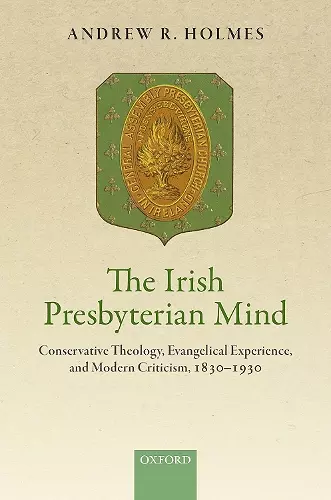The Irish Presbyterian Mind
Conservative Theology, Evangelical Experience, and Modern Criticism, 1830-1930
Format:Hardback
Publisher:Oxford University Press
Published:16th Oct '18
Currently unavailable, and unfortunately no date known when it will be back

The Irish Presbyterian Mind considers how one protestant community responded to the challenges posed to traditional understandings of Christian faith between 1830 and 1930. Andrew R. Holmes examines the attitudes of the leaders of the Presbyterian Church in Ireland to biblical criticism, modern historical method, evolutionary science, and liberal forms of protestant theology. He explores how they reacted to developments in other Christian traditions, including the so-called 'Romeward' trend in the established Churches of England and Ireland and the 'Romanisation' of Catholicism. Was their response distinctively Presbyterian and Irish? How was it shaped by Presbyterian values, intellectual first principles, international denominational networks, identity politics, the expansion of higher education, and relations with other Christian denominations? The story begins in the 1830s when evangelicalism came to dominate mainstream Presbyterianism, the largest protestant denomination in present-day Northern Ireland. It ends in the 1920s with the exoneration of J. E. Davey, a professor in the Presbyterian College, Belfast, who was tried for heresy on accusations of being a 'modernist'. Within this timeframe, Holmes describes the formation and maintenance of a religiously-conservative intellectual community. At the heart of the interpretation is the interplay between the Reformed theology of the Westminster Confession of Faith and a commitment to common evangelical principles and religious experience that drew protestants together from various denominations. The definition of conservative within the Presbyterian Church in Ireland moved between these two poles and could take on different forms depending on time, geography, social class, and whether the individual was a minister or a member of the laity.
Often only seen in stereotypical terms, Irish Presbyterians have now found a worthy expositor in Andrew R. Holmes ... It turns out there were some remarkable and unexpected things going on in the Irish Presbyterian mind. * Timothy Larsen, Times Literary Supplement *
Holmes's achievement in providing this thoughtful analysis of the Presbyterian Churchs institutions and clergy in turn points toward the importance of further study to explore the varied lay cultures of Irish Presbyterians. * Graeme Murdock, Trinity College Dublin, Journal of Reformed Theology *
...this superb volume should be required reading. * Alvin Jackson, University of Edinburgh, Irish Historical Studies *
Throughout, the book highlights the elasticity of 'conservative evangelicalism' and the needed recovery of confessional categories. * Stephen Steele, The Banner of Truth Magazine *
Andrew Holmes provides a much welcome historical perspective on high-level theological debates in PCI during a crucial period. . . . The Irish Presbyterian Mind is a welcome addition to scholarship that takes religion seriously as religion, and not merely a social-cultural phenomenon that it is subservient to political aspirations. * Gladys Ganiel, Queen's University - Belfast, Slugger O'Toole *
This new book...will be of wide interest at a time when many in the Church are having to ask hard questions about our ambitions to play a leading role in society. * Herald, the Presbyterian Church in Ireland Magazine *
The Irish Presbyterian Mind is nevertheless a significant contribution to our understanding of the making of modern Ireland, and especially of Ulster. It is a major achievement, that Holmes has completed despite the (surprising) paucity of manuscript sources and the inaccessibility of the some of the records (including much of the Davey Collection, which is important for 20th-century developments and post-Partition attitudes to social and economic - as well as theological - issues). * Professor Eugenio F Biagini, Sidney Sussex College, Cambridge University, The Irish Times *
ISBN: 9780198793618
Dimensions: 243mm x 164mm x 24mm
Weight: 616g
304 pages